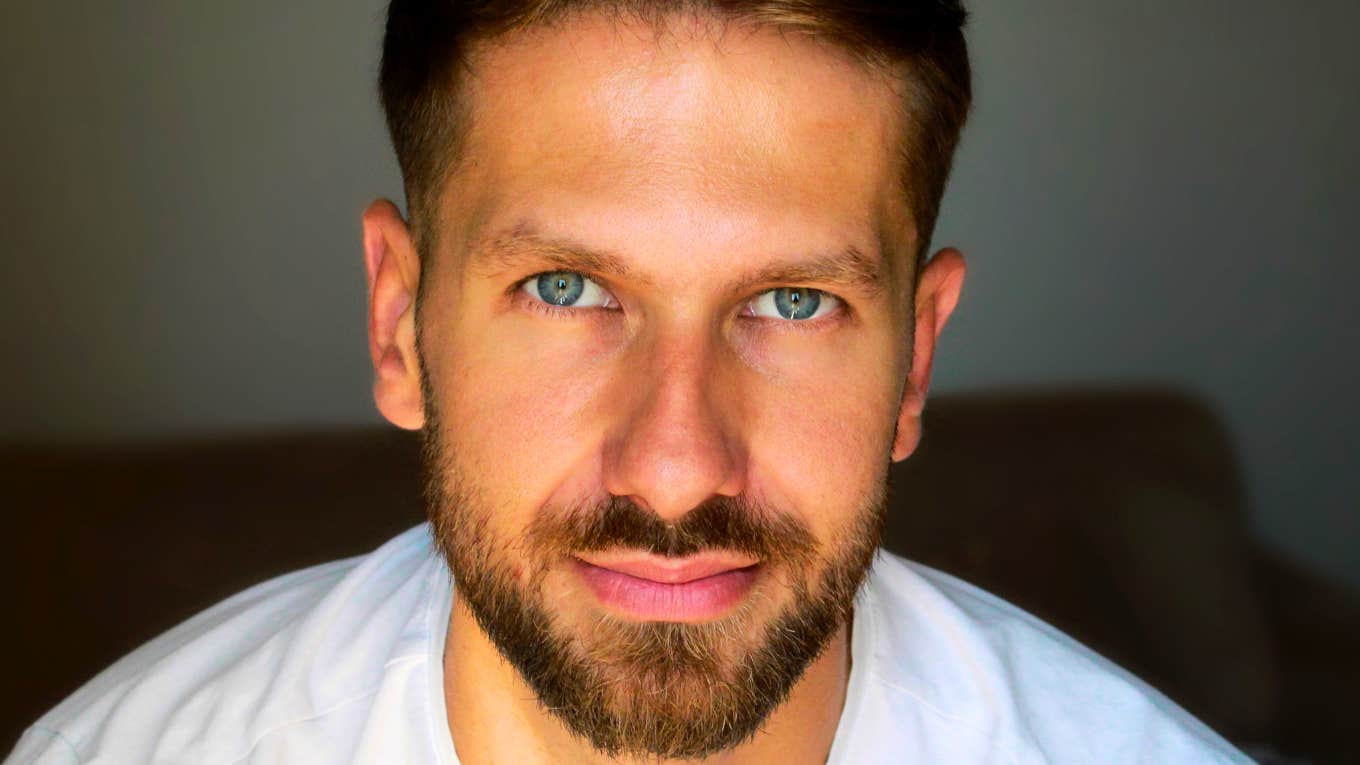Men Who Secretly Crave Real Love But Fear Vulnerability Usually Do These 11 Things
Men like this are afraid of opening up to anyone, and it often prevents them from getting the very thing they want most in the world.
 Stevan Zivkovic / Shutterstock
Stevan Zivkovic / Shutterstock Many men still face societal pressures to avoid vulnerability to protect their sense of masculinity, which is especially ironic when you consider that it's these two points of connection that make romantic relationships truly healthy and secure. Being able to both openly express emotions and create space for others is an indicator of healthy relationships and safe, long-term connections.
When they’re being pressured into a closed-off, disconnected place by society or the people around them, men often rely on avoidance, defensiveness, and isolation to cope. Men who secretly crave real love but fear vulnerability usually do things they think will keep them safe, but only cost them in the end. They’re conflicted between what the world is telling them, the unique masculinity they want to protect, and their desire for a deep, true love.
Men who secretly crave real love but fear vulnerability usually do these 11 things
1. They struggle with commitment
 Prostock-studio | Shutterstock.com
Prostock-studio | Shutterstock.com
Just when things are getting too “real” or they’re being forced to break down their emotional walls, men who fear vulnerability often run away. They struggle with commitment and often find more comfort in controlling the narrative of emotional expression by avoiding it entirely than leaning into its discomfort.
According to psychologist Diana Kirschner, men often struggle with commitment because they fear being controlled. Even if that’s not the case, they perceive a relationship to be a controlling engagement, rather than an empowering, secure bond, because it means they’re “forced” to share and acknowledge their emotions.
2. They get defensive
 PeopleImages | Shutterstock.com
PeopleImages | Shutterstock.com
According to psychotherapist Avrum Weiss, men often rely on defensiveness when they aren’t sure how to characterize, express, or make space for their own complicated emotions in arguments and conversations. It’s also possible that their discomfort with their partner’s emotions leads to their defensiveness, where they often justify their inevitable distance.
This habit is especially problematic in arguments and conflicts where their partners are already upset. Not only is their internal emotional dysregulation sparking fear and frustration, but they’re also unsure of how to cope with and deal with their partner, who’s visibly upset.
3. They ghost people
 MAYA LAB | Shutterstock.com
MAYA LAB | Shutterstock.com
It’s not surprising that ghosting — avoiding contact with someone online and in-person without warning — is a common experience for people dating in today’s world. It’s a tactic that many men use to avoid being vulnerable and expressing their emotions.
Whether things get too serious, too quickly, or they are afraid of hurting someone by expressing their real emotions, ghosting is another form of avoidance that men who crave real love but fear vulnerability often do.
Instead of owning up to their emotions, communicating them honestly, and leaning into the discomfort of vulnerability, they avoid it entirely.
4. They avoid conflict
 StockLab | Shutterstock.com
StockLab | Shutterstock.com
Avoiding conflict is a tactic many men use when they’re adamant about avoiding vulnerability. They’d rather side-step the problem, suppress their own emotions, and avoid the argument completely, even at the expense of their own internal well-being and relationships.
Whether that means spending more time out of the house when they’re upset, avoiding communication with their partners, or simply being rude in passing conversations to avoid deeper conversation, they’re willing to do whatever it takes to build up their own misguided sense of rigid masculinity for comfort.
5. They avoid labels
 Prostock-studio | Shutterstock.com
Prostock-studio | Shutterstock.com
Societal norms around masculinity and our patriarchal structure often pressure men to avoid emotions, vulnerability, and openness — both in their relationships and even alone with themselves. As they get older, this pressure tends to isolate them from the social support and relationships they need to thrive, so instead of learning to grow emotional intelligence, they retreat inward, filled with shame.
That’s part of the reason why they’ve been taught to avoid labels. It feels like a defense mechanism against the vulnerability they’ve been taught to fear and demean. By avoiding labels and offering up only the bare minimum in their connections, they protect themselves from being urged to open up.
6. They give the bare minimum
 Studio Romantic | Shutterstock.com
Studio Romantic | Shutterstock.com
Even though they crave a deeper, more meaningful connection, men who struggle with and fear vulnerability often give the bare minimum in their relationships. They fear drawing people in too close and feeling “forced” to offer up their own emotions, so they give just enough to keep their partners at arm’s length.
From avoiding moments for emotional connection to overlooking the importance of offering gratitude, men who are only capable of giving the bare minimum are often dealing with an internal dilemma surrounding vulnerability on their own.
7. They try to be perfect
 Perfect Wave | Shutterstock.com
Perfect Wave | Shutterstock.com
If they hold themselves to unrealistic perfectionist standards, try their best to uphold them, and show no signs of “weakness,” men who secretly crave real love but fear vulnerability can try their best to maintain a healthy relationship. However, they’ll inevitably fall short or make a mistake, which is when the avoidance kicks in — they want to create a facade of a “perfect masculine man,” and when it slips, they’re gone.
Of course, a truly healthy relationship isn’t defined by the perfection of its partners. It’s about honesty, trust, authenticity, and emotional openness. If a man is more concerned with perfection than vulnerability, it’s doomed to be an unhappy relationship from the start.
8. They criticize other people
 Miljan Zivkovic | Shutterstock.com
Miljan Zivkovic | Shutterstock.com
If they see another man being open about his feelings and crafting a healthy relationship on the foundation of vulnerability, chances are a man who’s stuck in a toxic state of misguided masculinity will make fun of them. Whether it’s rooted in jealousy, insecurity, or internal turmoil, they think breaking down another person’s vulnerability will make it more acceptable for them to avoid.
However, it’s these men who crave real love who have to know deep down that vulnerability is a nonnegotiable. Even if it’s entirely uncomfortable and scary for them right now, without it, they can’t achieve the real love they desire.
9. They self-sabotage when things are going well
 Prostock-studio | Shutterstock.com
Prostock-studio | Shutterstock.com
Even if it’s not entirely conscious, men who secretly crave real love but fear vulnerability may sabotage their relationships when they’re going well. They’re so accustomed to running away when things get serious and finding ways to sidestep real vulnerability that when they reach this point, something will inevitably go wrong.
They’re protecting themselves from pain, disappointment, and rejection, as clinical psychologist Lindsay Weisner suggests, so they don’t have to worry about opening up and being “less of a man” because of it.
10. They fear needing people
 MAYA LAB | Shutterstock.com
MAYA LAB | Shutterstock.com
Men who secretly crave real love may struggle to find it, not just because they’re afraid of vulnerability, but because they fear needing people. Their lives revolve around control, not just on an internal, emotional level, but also in their social lives and with their relationships.
They fear needing people, so much so that they subconsciously push people away.
11. They love silently
 MAYA LAB | Shutterstock.com
MAYA LAB | Shutterstock.com
Many men are perceived to be more romantic than women, largely because of the dichotomy between societally structured masculinity and their preference for action-based love languages over verbal ones. They’re always fixing things, running errands, and loving “silently,” avoiding vulnerability on a subconscious level all the time.
Men who secretly crave real love may not even be sure how to find it, because at their core, the closeness and vulnerability they need are scary and uncertain.
Zayda Slabbekoorn is a senior editorial strategist with a bachelor’s degree in social relations & policy and gender studies who focuses on psychology, relationships, self-help, and human interest stories.

